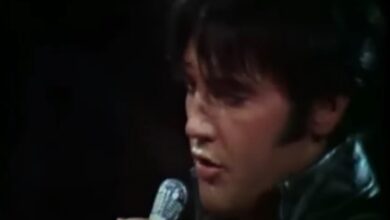Weary, He Delivered Legendary Performances One Last Time
Johnny Cash, known as “The Man in Black,” was not just a musical icon but a cultural symbol, with a career that spanned nearly five decades. Born on February 26, 1932, in Kingsland, Arkansas, Cash grew up in a poor farming family, which heavily influenced his lifelong themes of hardship and redemption. He began playing guitar as a teenager and joined the U.S. Air Force after high school. It was during this time he wrote his first songs, inspired by his experiences and the music of other artists of the day, including his admiration for the gospel music he was exposed to during his childhood.
Cash’s musical career began to take shape in the 1950s when he signed to Sun Records. His early hits, such as “I Walk the Line” and “Folsom Prison Blues,” showcased a unique blend of country, rockabilly, and folk influences, characterized by his deep, resonant voice and storytelling prowess. Cash’s music often reflected his struggles and triumphs, resonating with a broad audience and establishing him as a voice for the underprivileged and downtrodden. Over the years, he would release a staggering number of albums, many of which are now considered classics.
Johnny’s first marriage to Vivian Liberto ended in divorce, partly due to his escalating struggles with addiction. It was during these difficult times that Cash met June Carter, a member of the legendary Carter Family, who helped him navigate his battles with substance abuse and became his lifelong partner both on and off the stage. Their love story was tumultuous but enduring, marked by both their musical collaborations and personal commitments. They married in 1968 after a long courtship filled with both professional and emotional ups and downs.
The magical chemistry between Johnny and June shone through in many of their duet performances, creating a musical legacy that crosses generational divides. Together, they recorded iconic songs like “If I Were a Carpenter” and “Jackson,” which remain staples of American music. Their impressive body of work, underscored by mutual support, has inspired countless artists across various genres, reinforcing the power of collaboration in artistry.
Moving forward into the 1990s and early 2000s, Cash faced significant health challenges that could have hindered most artists. However, his resilience shone brightly during this time. After signing with producer Rick Rubin to create the acclaimed series of albums labeled American Recordings, Cash received renewed appreciation from critics and fans alike. This rebirth led to recordings of everything from classic folk songs to modern rock covers, proving his versatility and undying influence on music. One notable example is his haunting rendition of Nine Inch Nails’ “Hurt,” which featured a raw vulnerability that resonated with many and showcased his unique ability to bridge genres and generations.
Despite the adversities he faced, including a diabetes diagnosis and the loss of his beloved wife, Johnny continued to perform. His last concert at the Carter Family Fold was not merely an event; it was a poignant, heartfelt tribute to a life filled with music and love. Johnny’s condition was a stark reminder of the fragility of life, yet his spirit shone through as he took to the stage, embodying the very essence of his music.
The Carter Family Fold, where Cash performed for the last time, is steeped in history. This sacred venue stands as a beacon of country music and a celebration of the Carter family’s legacy. Surrounding it is the Clinch Mountain range, which holds personal significance for Johnny, linking him to his roots as well as the deep musical traditions of the Appalachian region.
In the months leading up to his passing, which occurred on September 12, 2003, Cash’s battle with health issues was evident, yet he maintained a bond with his family through music. His son, John Carter Cash, played a crucial role in supporting his father during this tough period, continuing the family tradition of music and production. Cash’s bond with John is a testament to his dedication to family and his ambition to pass on the heritage of storytelling through song.
In his final years, Cash faced immense grief with the loss of June. The depth of their love—often described as unwavering and profound—transcended their time together as musical collaborators. Their partnership remained a powerful influence in Cash’s life, driving him to find a way to keep the musical flame alive even in the absence of his soulmate.
As we reflect on Johnny Cash’s life and legacy, it becomes evident that his iconic status was built not just on his music, but on his ability to connect with listeners on a deeply emotional level. Through his authenticity, he carved a place in the hearts of many, transforming personal struggles into universal stories. Cash’s music remains alive today, inspiring new generations of musicians and music lovers who recognize the profound impact this singular artist had on the world. Even in his final performance, Johnny Cash delivered a powerful message that continues to resonate, reminding us that in life’s darkest moments, the light of music and love can guide us through.





